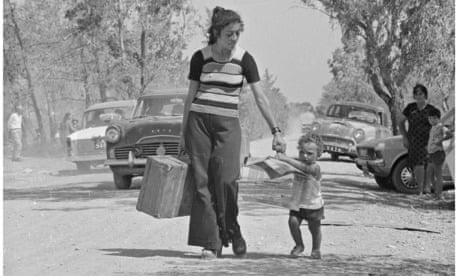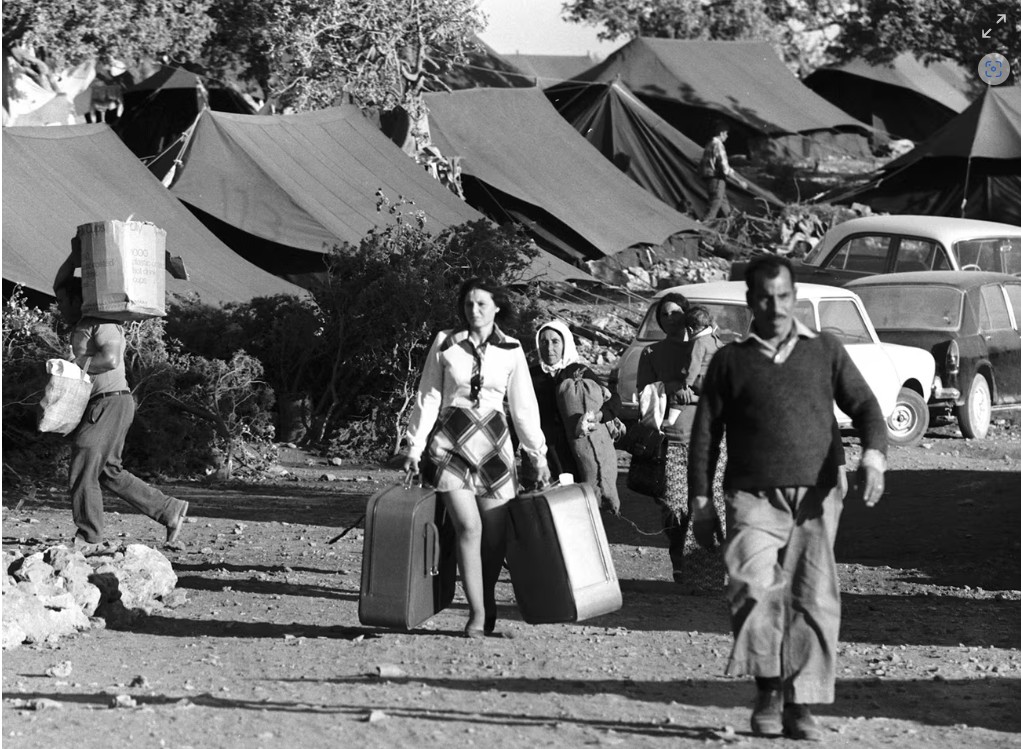In July 1974, Colin Smith was the Observer’s correspondent in Cyprus. Five decades on, he recalls paratroopers dropping from the skies and a grand hotel under siege.
Fifty years ago this month, Athens’s military junta, a colonels’ cabal bent on the union with Cyprus they called enosis, briefly believed that, after three failed attempts, they had finally assassinated Archbishop Makarios, Greek Cypriot president since 1960, when Britain granted Cyprus and its Turkish Cypriot minority independence.
In the late 1950s, Makarios, spiritual and political head of his people, was a firm supporter of both the enosis and the armed guerrillas who, until the British agreed on a formal ceasefire, fought under the acronym Eoka, which translates as National Organisation of Cypriot Fighters. But post-independence Greco-Turkish relations, between both Athens and Ankara and even more so in Cyprus itself, began to deteriorate.
One of the main problems was that memories of what had virtually been a civil war where the British recruited Turkish Cypriots and some Greek Cypriots firmly believed in their Athens-backed enosis dream, were too recent. Much to Makarios’s disgust, an organisation calling itself Eoka B appeared. Kidnapping and murder became rife. The archbishop began to make it plain that Cyprus was too close to Turkey to make union with Greece anything more than a dangerous dream.
Then his enemies tried to kill him. First in a car ambush, and when that failed, in an attempt to shoot down his helicopter that wounded his pilot. These failures only seemed to make his enemies more determined.
In July 1974, the Athens junta’s chosen instrument was a close-quarters assault on the presidential palace by a squadron of elderly Russian tanks, originally a gift to Makarios from Soviet Russia. In the midsummer heat, their turncoat crews had used incendiary ammunition at almost point-blank range to start an all-consuming blaze. Rumours spread that, despite the rites of his church, Makarios had been carelessly cremated.
Instead the smoke may well have saved his life by screening the back-door palace exit for His Beatitude and his bodyguards long enough to reach the car that delivered him to Paphos, the loyalist stronghold that was his birthplace. Here, while under sporadic artillery fire from a pirated patrol boat in junta hands, he had contemplated recruiting enough followers to make a stand but was persuaded by the Anglo-Americans not to push his luck. Instead a British helicopter delivered him to RAF Akrotiri – part of the 99 square miles Cyprus allowed Britain to keep after its independence – for a flight to London and then New York, and the podium that awaited him at the UN security council.

In Ankara, the scholarly Turkish prime minister Bülent Ecevit, a former journalist and translator into Turkish of TS Eliot, had not long been in office and was anxious to show his conservative opposition that he took Turkish Cypriot security as seriously as they did. Ecevit warned the junta that unless they immediately climbed down and Cyprus reverted to the previous state of affairs, including restoration of Makarios, its military would intervene.
On 19 July, Athens responded by announcing that as a first step it was reopening Nicosia airport and allowing the international press in. On arrival, we were greeted by young Greek English-speaking national guardsmen in well-pressed shirts and shorts carrying old Thompson submachine guns. “Welcome,” beamed one. “Now everything is all right. Now it is a Greek island.”
“What was it before, then?”
“A mixed-up island.”
There was a press conference hosted by Nikos Sampson, a former 1950s anti-British pro-independence Eoka hitman whom, for want of anyone better, the junta appointed acting president. To say the least, Sampson had had a chequered career. During the last decade of British rule he had started out as a cub reporter for the Cyprus Times and left professional rivals marvelling at his ability to be first at the latest street shooting. Then the British colonial police twigged that he was moonlighting as at least a target spotter and probably something worse. On the run and arrested in possession of a firearm, a hanging offence, he was reprieved and had served 18 months of a life sentence in Wandsworth when he was freed under the 1959 Zurich agreement that preceded independence.
Apart from him, the other stars of his press conference were the newly released prisoners of the tactical police reserve, Makarios’s Praetorian guard, with their tales of agonising interrogation. Some of their exhibits were worthy of the Spanish Inquisition, with the possible exception of a battery-operated rubber vibrator which a French female photographer had Sampson holding up for a photographic feeding frenzy until he realised what he was doing.

We departed for the Turkish side of the argument. Rauf Denktash, a London-trained lawyer, was the leader of the Turkish Cypriot community and kept beneath his desk a spaniel that snapped at visiting feet. “Just like Makarios, that dog,” said Denktash. “Snaps at his friends and doesn’t recognise his enemies.”
Denktash operated from an office near what had become known as Nicosia’s green lines (the name dated from the early 1960s, when, three years after independence and the start of intercommunal reciprocal slaughter, a British UN officer picked up his green marker and drew the lines on his map where it was hoped Greeks and Turks might learn to travel with impunity).
Then, shouting his head off, one of Denktash’s aides burst in. “This is it!” a triumphant Denktash translated. “The BBC are reporting a Turkish armada heading for Cyprus. There couldn’t be a better time for Turkey to come here. The whole world will be behind us. You better find yourselves a bed.”
The five-storey Ledra Palace, the Levant’s most famous hotel, where the exiled King Farouk once sipped brandy sours disguised as nothing more lethal than lemonade with a dash of angostura bitters, was only a few minutes’ walk from the Venetian walls of Nicosia’s old city. From behind the reception desk’s polished mahogany, one of the under-managers, famously costumed in morning suit winter and summer, war and peace, examined us with obvious disdain.
Didn’t we realise several chartered Lebanese fishing boats from Beirut, heavy with our competitors, had berthed in Famagusta yesterday? But, providing we were prepared to share single rooms, he would see what he could do. Soon he was checking in what turned out to be the Ledra’s last paying customers.
Some of us not only shared rooms but also snoozed on the floor waiting for our turn on the teleprinter, if we had anything to say. After all, it might never happen. They might just cruise up and down Cyprus’s northern coast for days on end until Athens and Ankara came to their senses and everybody went home.
Even so, Cyprus had a sizeable Turkish Cypriot minority, and a Turkish coast only 40 miles away, much closer than Greece. And there was no bigger army than Turkey’s in all of cold war Europe.
Meanwhile, the Ledra tried to keep up standards. A musical trio – electronic keyboard, bass and drums – set up a mic and two big speakers behind the tennis courts and swimming pool. The keyboard player, a Vietnam veteran, started by accompanying himself on that year’s Paper Lace hit Billy Don’t Be a Hero, which is based on an American civil war song. Drinks were served. After the concert, the hotel’s management announced that a curfew had been imposed and we were not allowed to leave the hotel until further notice. It was a Friday, and somebody noticed that the Muslim calls for prayer seemed later than usual.
The first shots of Turkey’s Operation Attila woke us shortly after daybreak, followed by the surprising sight of Turkish paratroopers dropping from their circling transport aircraft to reinforce the Turkish Cypriot militia in the city’s northern sector.
At the same time, we had our first brief taste of Turkish air support as their Skyhawks dived and climbed, leaving their calling cards of black smoke. It turned out that, in one instance, these fires were fuelled by a burning mental hospital mistaken for a nearby broadcasting station.

Overnight, some 20 Greek Cypriot national guard had established themselves on the Ledra’s roof and built sandbagged nests for two belt-fed .50 Browning machine guns of a type usually installed in armoured vehicles. With the aid of binoculars, they began firing long bursts at suspected targets below them, barring entrance to a growing media audience when they realised its presence might give away their position.
Nonetheless, by 8am the Turks had located them, and with startling accuracy sent a single mortar bomb that killed one of the rooftop contingent, seriously wounded another and inflicted lighter injuries on several more.
With the hotel lifts uncertain, casualties and equipment were carried as gently as possible down the five flights of steps that led to the lobby … and an international media crush. Cameras as big as bazookas awaited. Having their wounded turned into primetime viewing enraged the national guard, one of whom rolled about the floor with a drawn revolver until he was disarmed by his comrades. The two Brownings were set up in the area where the trio had given their surprise alfresco concert – their speakers were still there – and used on an area beyond the tennis courts where Turkish infantry had been spotted.
While this was going on, the reputation of the press corps was somewhat redeemed by Donald Wise, a former British para officer and unlikely Daily Mirror reporter. Despite incoming fire, he drove the worst-hit man among the wounded from the Ledra rooftop to hospital in his hired Mini. The next day, a French-Canadian unit serving in the UN peacekeeping forceemptied the Ledra of armed elements and press alike as the hotel became part of the buffer zone the Canadians were trying to re-establish between combatants.
The fighting would drag on for almost a month, and casualty figures are extremely woolly. Even quite reliable sources cite between 4,500 and 6,000 Greek Cypriots killed, wounded or missing, believed dead. For the Turks – who, apart from close air support, had 180 contemporary tanks compared to the Greek side’s rusting Stalingrad relics – it was between 1,500 to 3,800 dead. The refugee displacement was enormous: roughly 200,000 Greek Cypriots came south and 50,000 Turkish Cypriots went north.

The 1974 war in Cyprus lasted just under a month. It dragged on through innumerable broken ceasefires, Kissinger-sponsored Geneva peace talks and, almost in its last hours, a Turkish tank attack that captured Famagusta, its only deep-water port.
In just under a month, the poetical Ecevit had won the makings of a Turkish Republic of Northern Cyprus that occupied just over a third of the island in the name of a Turkish Cypriot community not quite a fifth of its total population. It still does. The Ledra Palace, its glory days long over, has spent the last half-century in the buffer zone, serving as a barracks for British UN troops and a rendezvous for high-level negotiations that get nowhere.
For much of that time, quoting Lenin, some nearby graffiti declared: “There are decades where nothing happens and there are weeks where decades happen.” It appears Cyprus is still awaiting its decade.
In 1974, military historian Colin Smith was the Observer’s chief roving correspondent, and was named international reporter of the year in the British press awards for, among other things, his coverage of Turkey’s invasion of Cyprus
Source: The Guardian

